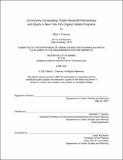| dc.description.abstract | This thesis explores the ecosystem of public, nonprofit, and private organizations that contribute to household organic waste composting in New York City, and the public-nonprofitpartnership (PNPP) efforts that the City’s Department of Sanitation (DSNY) has employed to realize its compost education, outreach, collection, and processing efforts. These PNPPs evolved in the context of an ecosystem of nonprofit and private sector actors, as well as purely municipal efforts to collect organic material and divert it from the city’s waste stream. The research investigates how DSNY’s PNPP strategies affected the geographic, demographic, and social equity of its compost initiatives through a series of 16 semi-structured interviews with people both involved in and working outside of the partnerships, and geographic and quantitative analysis of public data. The research reveals the unique bureaucratic circumstances under which the PNPPs formed, how their configuration limited their ability to work with informal and commercial entities also relevant in the space and affected the equity of program services. The study finds that PNPPs succeeded in serving a diverse and representative population, but that public funds may have directly benefited wealthier and Whiter communities while more marginalized Black, brown, and poor communities were left to be served by volunteers. In addition, the research finds that community composting as practiced by the PNPPs fostered numerous ancillary social benefits like the creation of community cohesion, the development of local green jobs, and the encouragement of deep volunteerism that went beyond collecting and processing household organic waste and therefore escaped the comprehensive measurement, reporting, and support of the Sanitation agency. | |
